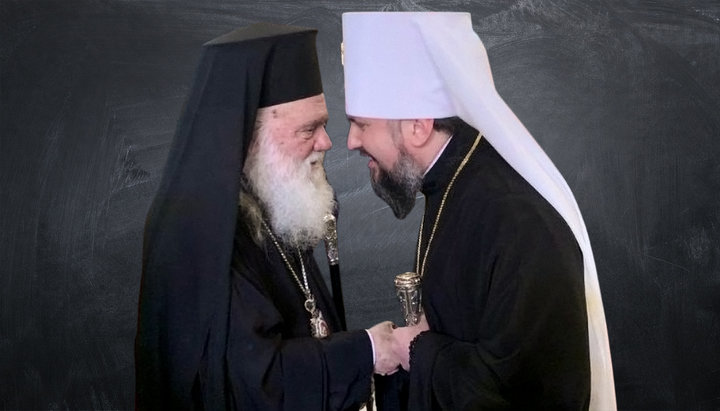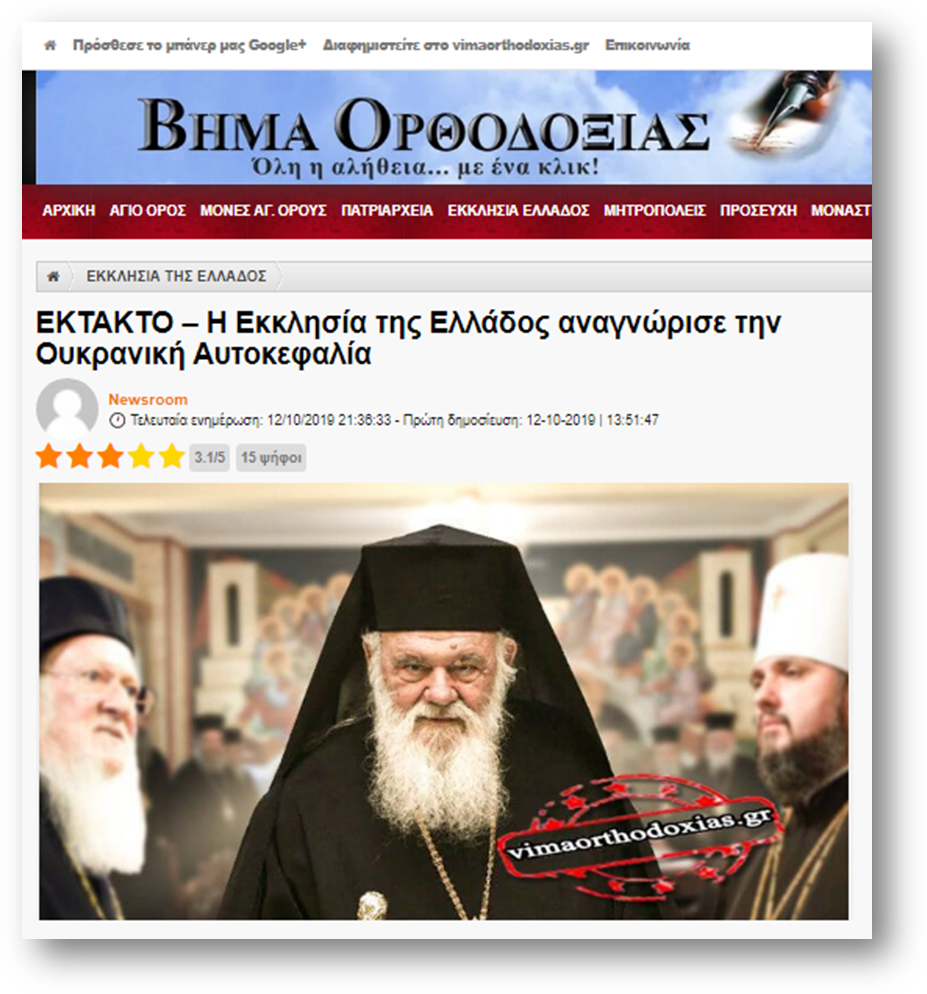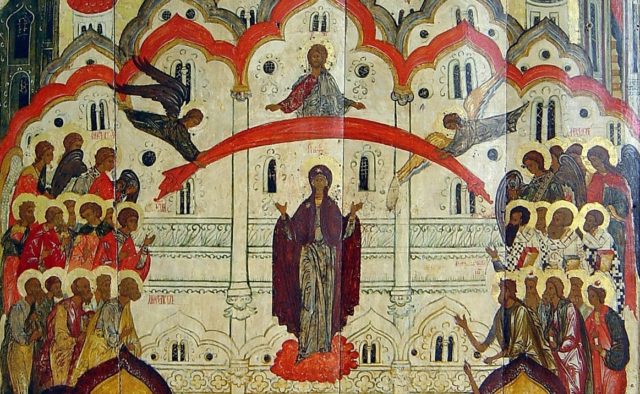Greeks recognize OCU: What's happened and what’s next

The Greek Orthodox Church has recognized the OCU. This happened contrary to the calls of thousands of Greek laity, priests and bishops. Contrary to common sense, let alone the canons of the Church. It seemed most likely that the Greeks would again postpone the resolution of this issue. But it happened differently. In this article we will try to answer the questions: why did this happen, what does it mean and what will happen next?
Why did this happen?
We’d better use reverse logic while searching for an answer.
Perhaps, the Greeks recognized the OCU because they are sure that this is really a “blessed local church”? That it was born on a canonical basis through the actual unification of the whole Orthodoxy in Ukraine?
No, it is not so. Otherwise, why did the Greeks procrastinate with the recognition for almost a year? Besides, it’s common knowledge that the creation of the OCU did not cure the church schism in Ukraine but deepened it even more. Moreover, the creation of the OCU gave rise to a new split, this time between Epiphany Dumenko and “honorary patriarch” Filaret Denisenko.
Perhaps, the OCU is guided by the commandments of God in its activities? Shows love and mercy to others?
No, it is not so. Raider seizures of temples, atrocities by national radicals, violence and threats from supporters of OCU are evident and continually reported facts being recognized internationally by the UN and the OSCE, as well as other organizations.
Perhaps, the OCU is a persecuted church under pressure and needs to be supported via recognition?
No, it is not so. Only few religious organizations in history have enjoyed such powerful state support in the person of the former Ukrainian authorities as the OCU. Everyone from the president to the heads of village councils promoted this organization, including also SBU, Prosecutor General’s Office and Ministry of Internal Affairs.
Then why did the Greek hierarchs recognize the OCU?
The answer can be read in this photo.

High-ranking employees of the US Department of State do not even hide their active involvement in the creation of the OCU and its legitimization. They regularly meet with both church and political figures in different countries. In the press releases, the topic of negotiations is directly indicated: lobbying the OCU.
Before each significant event in the promotion timeline of the OCU, starting from the decision of Patriarch Bartholomew and ending with yesterday's decision of the Church of Greece, the employees of the Department of State held relevant negotiations. The American order was fulfilled by Constantinople a long time ago, now it has been fulfilled by the Hellenic hierarchs.

Two years ago, the article “Changing gender or cultural code? How Orthodoxy is traded in Greece” described how in the country, which calls itself Orthodox, its parliament (consisting mostly of people who also call themselves Orthodox) passed a law on gender change starting from the age of 15. It was done despite the direct prohibition of the Holy Scriptures not only to change one's gender, but also to wear clothes of a different gender: “The woman shall not wear that which pertaineth unto a man, neither shall a man put on a woman's garment: for all that do so are abomination unto.” (Dt. 22:5). In 2015, the Greek parliament legalized the so-called same-sex marriages. The article analyzes how Western countries, driving Greece into outrageous debts, force it to make decisions directly contrary to the very essence of the Greek soul, which is Orthodoxy (according to their own definition).
Today we have witnessed how this story continues. The Greeks were forced to make a decision that contradicts, as has already been said, the truth of God, the canons of the Church, and common sense. As a reminder, in Greece the Church is incorporated into the system of state bodies, and all hierarchs and priests receive salaries from the state budget.
The decision of the Council of Bishops of the Church of Greece is dictated by political considerations and no other.
This is not just big talk. It is enough to recall some obvious facts.
Firstly, how could the OCU be recognized if the hierarchs of almost all the Local Churches speak about the invalidity of Epiphany Dumenko’s ordinations and those of other "bishops" of the OCU?
Epiphany was "ordained" on November 15, 2009 by Filaret Denisenko, who had been excommunicated from the Church, and another seven "bishops" who were ordained by excommunicated Filaret. How can one be recognized as the head of the Church if he is not even a priest, let alone a bishop?!!!
Secondly, how could the OCU be recognized when both Epiphany Dumenko and the head of the Ukrainian Greek Catholics, Sviatoslav Shevchuk, openly declare the future unity of their religious organizations? Does it mean that the Greeks actually recognized the future Catholics of the Orthodox rite and are going to serve the Divine Liturgy with them?!!! And where then is your Orthodox faith in this case, Hellenic gentlemen?!!!
Thirdly, how can one recognize the OCU, which is involved in the seizure of Orthodox temples, whose supporters beat Orthodox priests and believers, drive them out of their homes with their families, take property, threaten and intimidate in every way possible? How can a believer, not to mention a bishop, approve of these inhuman acts?!!! But the hierarchs of the Church of Greece actually approved the persecution which the UOC believers are subjected to in Ukraine!
Fourth, how could the OCU be recognized when in Ukraine there is a multi-million canonical UOC? Gentlemen, you recognized His Beatitude Onuphry yesterday and said that he is almost a holy man! And today you pretend he does not exist at all! Let's get to grips, brothers and sisters! In the communiqué published upon the results of the Bishops' Council of the Greek Church, which made a decision on the "Ukrainian issue", there is NOT A SINGLE WORD about the Ukrainian Orthodox Church. It looks as if neither Metropolitan Onuphry with one hundred hierarchs nor tens of thousands of clergy and monks, nor millions of the UOC believers exist for the Greek Orthodox Church from now on!!!
Is it possible for all this to recognize the OCU out of purely religious considerations?! Is it not crystal clear that there is only politics here and nothing else?
What does the decision of the Greek Bishops' Council imply?
Firstly, this means that a split in Orthodoxy has actually occurred!
When the OCU used to be recognized only by Phanar and it could be said that one Local Church made a mistake which it alone or all Local Churches together could correct, today the situation is fundamentally different. Now the Greek Church has already sided with the untruth. Tomorrow demarcation may continue. And the criterion for this demarcation is not about recognition or non-recognition of the OCU at all, but subordination or non-subordination to the Patriarch of Constantinople as the “head” of the Orthodox Church. The hierarchs, who participated in the Council of the Church of Greece, in an interview with the Greek edition Vimaorthodoxias directly stated that the Church of Greece traditionally supports the Patriarchate of Constantinople and cannot act otherwise.

As the famous Ukrainian human rights activist Oleg Denisov writes in his article “The decision of the Greek Synod is a statement of the worldwide split of Orthodoxy and overall weakening of church authority”:
“It is necessary to realize that Constantinople not only created a new structure of the OCU, it destroyed the fundamental principle of Catholicity in the Church, and if the remaining Local Churches continue their silence – this will lead to the actual inconsistency of modern religious structures with the gospel principles of apostolic succession."
Indeed, we are witnesses of how the Patriarchate of Constantinople single-handedly makes decisions on issues that require a conciliar decision and then tries to subordinate all Local Churches to its will. In the case of the Greek Church, Phanar succeeded. This means that the authority of the Patriarch of Constantinople was placed above all the canons of the Church, above the gospel spirit of love and common sense.
The decision of the Greek Council means that the Greeks sacrificed the truth for the sake of politics. This means that those in power can force them to make the decisions beneficial to the former. The Greeks have revealed their weakness.
Secondly, the decision of the Greek Council means that the Greeks gave up the truth for the sake of politics. This means that those in power can force them to make those decisions beneficial to them. The Greeks have revealed their weakness. This is very sad, to say the least. Everyone is already somehow accustomed to the fact that Phanar is fulfilling the will of the United States and disregarding everything. After Patriarch Athenagoras of Constantinople said shortly after the election in an interview with Evening Independent magazine, “I will always promote America and American interests, live on American ideals and preach them. I will never forget this great country”, there is small wonder. However, everyone considered the Greek Church to be a certain pillar of Orthodoxy. But the reality appears different.
What’s next?
In the near future we should expect an official response from the Holy Synods of the UOC and the Russian Orthodox Church. How tight it will be – we’ll see. It can be assumed that our Ukrainian Holy Synod will declare its position quite clearly and unambiguously. After all, the decision of the Greek Church is nothing else but betrayal – the betrayal of not only the Ukrainian Orthodox Church but Orthodox faith as it is.
As already mentioned, the split in Orthodoxy has occurred and it will deepen further. What other Local Churches will support Phanar – we will not make any conjectures. Let us cite only one quotation from the Gospel in this connection: “From that time many of His disciples went back, and walked no more with Him. Then Jesus said unto the twelve, Will ye also go away?” (John 6: 66-67).
But one thing is already absolutely clear – the Churches will be divided by the criterion of their treatment of the Patriarchate of Constantinople. Some will recognize the authority of the pope from Constantinople (although, probably, more correctly from Istanbul), while others will uphold the principle of conciliarity. The answer to the question, on whose side the truth is, should be sought in the article of the Creed: "I believe in the One, Holy, Catholic and Apostolic Church."
Those who today recognize Phanar’s unlawful decisions on Ukraine will be forced tomorrow to recognize other, no less unlawful decisions. Most likely, these will be decisions on rapprochement, up to complete unity with the Catholic Church. This has already been announced by both Patriarch Bartholomew and Pope Francis.
Another possible consequence of today's decision of the Greek Church may be a split in itself, as well as between the Athonite monasteries. For example, Metropolitan Simeon of New Smyrna, in his open letter to the hierarchs of the Church of Greece, warned of a possible split in Orthodoxy in the event of recognizing the OCU. The famous Greek theologian, Protopresbyter Theodore Zisis calls the actions of Patriarch Bartholomew “a new crusade against the Russian Church on the part of the Uniate crusaders and schismatics of Ukraine, in which Patriarch Bartholomew takes the most active part in alliance with the pope, who only pretends that he remains neutral.”
Several thousand representatives of the clergy, monastics and lay people of the Greek Orthodox Church published an open letter on the “Ukrainian issue” to Archbishop Ieronymos of Athens and the hierarchs urging not to recognize the OCU individually, contrary to the position of other Churches. How will they put up with this situation?
One shouldn’t also forget that in Greece there is also a so-called split of the old calendarists, supporters of the old Julian calendar. According to various estimates, their number reaches 800 thousand, which is very much for small Greece. They might use this decision of the Church of Greece to increase the number of their supporters, as well as to recognize their structure by other Local Churches.
Split between the Church and "Phanarodoxy"
Obviously, the split that arose in Orthodoxy will deepen even more. As it was aptly noted in one of the articles on this subject, “Phanarodoxy” is going to stand out from Orthodoxy. When this division has already become more or less formalized, the Local Churches, remaining Orthodox, will try to convene the Ecumenical Council and condemn "Phanarodoxy" as heresy. The group of “Phanarodox” will increasingly deeper plunge into ecumenism and liberalization of church life. A vivid example is the decision of the Church of Constantinople on the acceptability of divorces and remarriages for priests. The degree of their dependence on secular authorities will grow.
In addition, it is no longer a presumptive but a certain consequence of the recognition by the Greek Church of the OCU that illegal actions against the believers of the UOC will only step up. Supporters of this organization received additional incentives for further seizure of temples and other lawless acts. We reiterate with big disappointment that the reverend Greek hierarchs, who were considered the stronghold of the Orthodox faith, gave national radicals and other enemies of the Church additional weapons in their struggle against the Church.
In conclusion, I would like to draw attention to a very symbolic moment in this situation with the recognition by the Greeks of the OCU. This decision was made on the eve of the Feast of the Intercession of the Most Holy Theotokos, which is highly revered in Russia and completely disregarded in Greece, although it should have been the other way around.

Recall, we celebrate the event when the Most Holy Theotokos protected Constantinople with Her Veil from the raid of not yet baptized Rus tribes in the 9th century. Our ancestors. Then, after prayer in the Blachernae church and the descent of the Robe of the Virgin into the waters of the Bosphorus, a rising storm scattered the rooks of the Rus men and Constantinople was saved. We celebrate our own defeat. By the fact that we celebrate Intercession holiday, we show that we are on the side of the Orthodox Greeks rather than our gentile ancestors. We place our Orthodox faith above our national pride.
And what about the Greeks?











